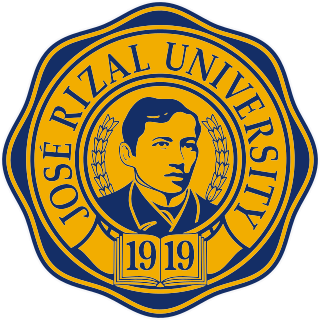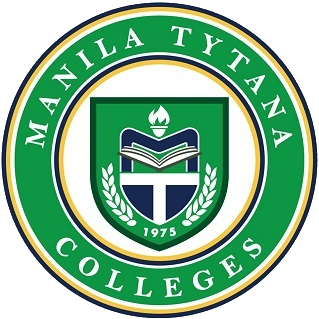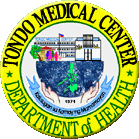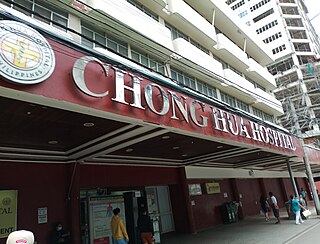
The Philippine Accrediting Association of Schools, Colleges and Universities (PAASCU) is a private, voluntary, non-profit and non-stock corporation which was registered with the Securities and Exchange Commission of the Philippines. It is a service organization that accredits academic programs which meet commonly accepted standards of quality education.

José Rizal University, also referred to by its acronym JRU is a private non-sectarian, non-stock coeducational basic and higher education institution located in Mandaluyong, Metro Manila, Philippines. It was founded in 1919 by Don Vicente Fabella, the Philippines' first certified accountant. José Rizal University is one of the schools situated in the east side of Mandaluyong, the others being the Plaridel Campus of Arellano University and Don Bosco Technical College.

West Visayas State University is a public normal research university located in La Paz, Iloilo City, Western Visayas region of the Philippines. It was established in 1924 as Iloilo Normal School under the tutelage of the Thomasites, but dates back its founding in 1902 as a part of Philippine normal school system with Iloilo National High School established by the American colonial government. It later became West Visayas State College in 1965 and acquired its university status becoming West Visayas State University in 1986.

Manila Tytana Colleges (MTC), or just simply Tytana, the educational arm of the Metrobank group, has carried on since 1975.

The Iligan Institute of Technology, commonly referred to as, is a public coeducational institution of higher learning and research university located in Iligan City, Philippines, charted in 1968 by Republic Act 5363 and integrated as the first autonomous unit of the Mindanao State University System in 1975.

The Presidential Communications Group, or simply the Communications Group, is the collective name for the offices within the Office of the President of the Philippines and refers to the position of the Secretary of Presidential Communications Office formerly known as Office of the Press Secretary and the Secretary of the Presidential Communications Operations Office (PCOO). The office of the presidential spokesperson was previously under the Communications Group.

The Technological Institute of the Philippines is one of the country’s engineering colleges that also offers programs in computing, architecture, business, education, and the arts located in Metro Manila, Philippines. It is a private non-sectarian stock school founded on February 8, 1962, by a group of educators headed by Engineer Demetrio A. Quirino, Jr. and Dr. Teresita U. Quirino.

Trinity University of Asia, also known as TUA or simply Trinity, is a non-sectarian private university located in Quezon City, Philippines. It was named after Trinity College (Connecticut) whose president then was the founder's father. Formally established in 1963 as an elementary, high school and collegiate educational institution by the Protestant Episcopalians, it dates back its earliest establishment in 1907 when the Trinity University of Asia - St. Luke's College of Nursing, its oldest organic academic unit, was established under the St. Luke's Hospital, the present day St. Luke's Medical Center. It later acquired its university status on July 18, 2006.

The Tondo Medical Center, also known as Tondo Med, is a 300-bed capacity tertiary public medical center established in 1971, under the supervision and control of the Department of Health (DOH). It is located on North Bay Boulevard, Tondo, Manila, Philippines. Tondo Med has eight hospital departments, all of which are currently accredited with their respective specialty societies except for EENT and Radiology which are still in the process of accreditation with the DOH.

The University of Science and Technology of Southern Philippines is a state university system in the Philippines established on August 16, 2016, by virtue of Republic Act 10919 through the amalgamation of the Mindanao University of Science and Technology (MUST) in Cagayan de Oro and the Misamis Oriental State College of Agriculture and Technology (MOSCAT) in Claveria, Misamis Oriental. Both campuses are located in Northern Mindanao, considered the Gateway to Mindanao, which offers a strategic locational advantage for the institution to train and develop students from all the other regions of Mindanao.
Misamis University is a privately owned, non-sectarian, non-profit educational institution founded by Dr. Hilarion Feliciano and Doña Maria Mercado Feliciano in 1929. Misamis University is currently the only autonomous university granted an ISO 9001:2015 Management System Certified granted by Det Norske Veritas-Germanischer Lloyd Business Assurance by the Commission on Higher Education (CHED) in Northwestern Mindanao, and awarded by te Philippine Association of Colleges and Universities Commission on Accreditation as the Most Number of Accredited Programs in Region X.

The University of Eastern Philippines is the first state university in the Visayas. It offers the largest number of undergraduate and graduate degree programs and short-term courses and certificates among the higher education institutions in the Eastern Visayas region. Its flagship campus is in Catarman, Northern Samar.
Higher education in the Philippines is offered through various degree programs by colleges and universities—also known as higher education institutions (HEIs). These HEIs are administered and regulated by the Commission on Higher Education (CHED).
Higher education accreditation is a type of quality assurance process under which services and operations of post-secondary educational institutions or programs are evaluated to determine if applicable standards are met. If standards are met, accredited status is granted by the agency.

The Philippine Overseas Employment Administration was an agency of the government of the Philippines responsible for opening the benefits of the overseas employment program of the Philippines. It is the main government agency assigned to monitor and supervise overseas recruitment and manning agencies in the Philippines. The POEA's office is located at EDSA corner Ortigas Avenue, Mandaluyong, Philippines.

The Philippine Health Insurance Corporation (PhilHealth) was created in 1995 to implement universal health coverage in the Philippines. It is a tax-exempt, government-owned and controlled corporation (GOCC) of the Philippines, and is attached to the Department of Health. On August 4, 1969, Republic Act 6111 or the Philippine Medical Care Act of 1969 was signed by President Ferdinand E. Marcos which was eventually implemented in August 1971.

Chong Hua Hospital is a hospital in Cebu City, Philippines. It is a non-stock, non-profit organization, owned and managed by the Asociación Benévola de Cebú.

The Bureau of Immigration, also known between 1972 and 1987 as the Bureau of Immigration and Deportation, is the immigration regulatory and control body of the Philippines. It was established by the Philippine Immigration Act in 1940, although a predecessor agency had existed as part of the Bureau of Customs since 1899.

Pederalismo ng Dugong Dakilang Samahan is a national political party in the Philippines accredited by the Commission on Elections (COMELEC) on October 30, 2018. It was founded by Presidential Anti-Corruption (PACC) Chairman Greco Belgica. He says that the members are the original followers of Philippine president Rodrigo Duterte in the 2016 presidential election. The main thrust of the party is for federalism to be applied to the Philippines. The party sought accreditation from the Commission on Elections so that it can run candidates for the 2019 midterm election.
















